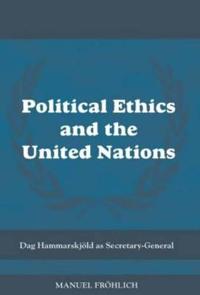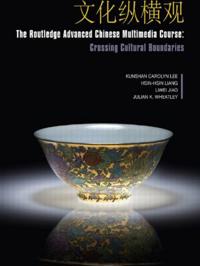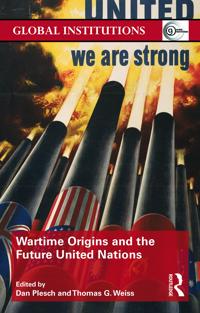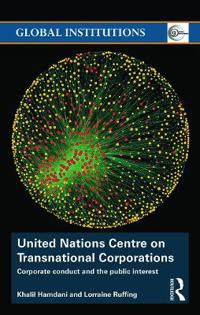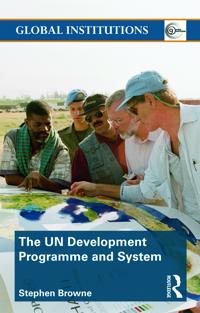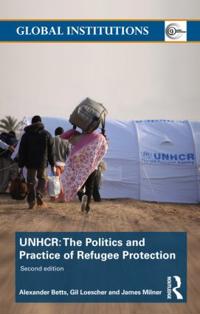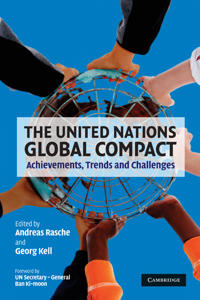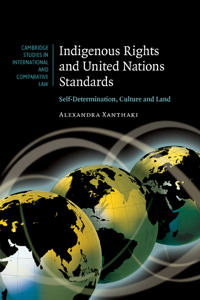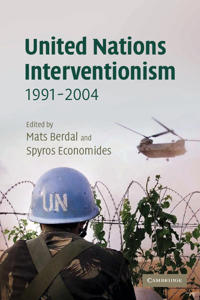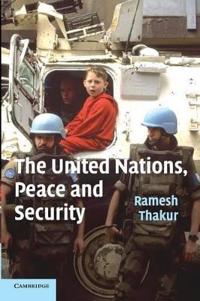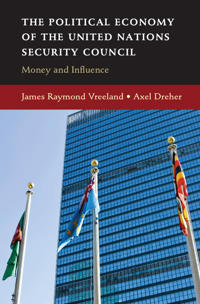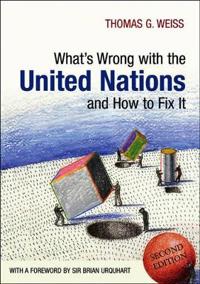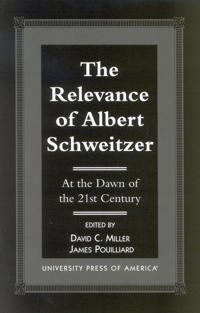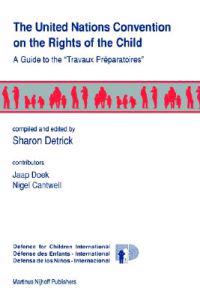Political Ethics and the United Nations
ISBN: 9780415588331 - UTGIVEN: 2010-07Based on a wealth of sources, files and interviews, and including previously unpublished material, this book explores the foundations of the political ethics of Dag Hammarskjold, the second Secretary-General of the United Nations, examining how they influenced his actions in several key crisis situa[...]
Gender, Human Security and the United Nations (Häftad)
ISBN: 9780415622233 - UTGIVEN: 2012-04This book examines the relationship between women, gender and the international security agenda, exploring the meaning of security in terms of discourse and practice, as well as the larger goals and strategies of the global women's movement. Today, many complex global problems are being located with[...]
United Nations Industrial Development Organization (Inbunden)
avStephen Browne
ISBN: 9780415686396 - UTGIVEN: 2012-06-07Wartime Origins and the Future United Nations
ISBN: 9780415712675 - UTGIVEN: 2015-01The creation of the UN system during World War II is a largely unknown or forgotten story among contemporary decision makers, international relations specialists, and policy analysts. This book aims to recover the wartime history of the United Nations and explore how the forgotten past can shed ligh[...]
United Nations Centre on Transnational Corporations (Inbunden)
avKhalil (EDT) Hamdani, Lorraine (EDT) Ruffing, Khalil (EDT) Hamdani
ISBN: 9780415733007 - UTGIVEN: 2015-03The United Nations Centre on Transnational Corporations (UNCTC) was established in 1975 and abolished in 1992. It was an early effort by the UN to address the overlapping issues of national sovereignty, corporate responsibility and global governance. These issues have since multiplied and deepened w[...]
United Nations Development Programme and System (UNDP) (Storpocket)
avStephen Browne
ISBN: 9780415776509 - UTGIVEN: 201107This volume provides a short and accessible introduction to the organization that serves as the primary coordinator of the work of the UN system throughout the developing world -the United Nations Development Programme (UNDP). The book: traces the origins and evolution of UNDP, outlining how a centr[...]
The United Nations High Commissioner for Refugees (UNHCR) (Häftad)
avGil Loescher, Alexander Betts, James Milner
ISBN: 9780415782838 - UTGIVEN: 201111This revised and expanded second edition of The United Nations High Commissioner for Refugees (UNHCR) continues to offer a concise and comprehensive introduction to both the world of refugees and the organizations that protect and assist them. This updated edition also includes: up to date coverage [...]
Never Learn to Type: A Woman at the United Nations (Inbunden)
avMargaret Joan Anstee
ISBN: 9780470854242 - UTGIVEN: 200305The concept of multiple unperceived dimensions in the universe is one of the hottest topics in contemporary physics. It is essential to current attempts to explain gravity and the underlying structure of the universe. The history of how such an unfathomable concept has risen to prominence takes cent[...]
Never Learn to Type: A Woman at the United Nations (Häftad)
avMargaret Joan Anstee
ISBN: 9780470854310 - UTGIVEN: 2004-04-30The United Nations Global Compact (Häftad)
ISBN: 9780521145534 - UTGIVEN: 201006The United Nations Global Compact is a strategic policy initiative that encourages businesses to support ten universal principles in the areas of human rights, labor standards, the environment, and anti-corruption. It is the world's largest voluntary corporate responsibility initiative with more tha[...]
Indigenous Rights and United Nations Standards (Häftad)
avAlexandra Xanthaki
ISBN: 9780521172899 - UTGIVEN: 2010-08The debate on indigenous rights has revealed some serious difficulties for current international law, posed mainly by different understandings of important concepts. This book explores the extent to which indigenous claims, as recorded in the United Nations forums, can be accommodated by internation[...]
United Nations Interventionism, 1991-2004 (Pocket)
avMats (EDT) Berdal, Spyros (EDT) Economides, Mats (EDT) Berdal
ISBN: 9780521547673 - UTGIVEN: 2007-03After years of paralysis, the 1990s saw an explosion in the number of United Nations field operations around the world. In terms of scope and level of ambition, these interventions went beyond the tried and tested principles of classical UN peacekeeping. Indeed, in some cases - such as Cambodia, Ko[...]
The United Nations, Peace and Security: From Collective Security to the Responsibility to Protect (Häftad)
avRamesh Chandra Thakur
ISBN: 9780521671255 - UTGIVEN: 200606A unique insight into the changing role and structure of the United Nations.
Climate Change 2007 - the Physical Science Basis (Pocket)
avUnited Nations, Intergovernmental Panel On Climate Change
ISBN: 9780521705967 - UTGIVEN: 2007-09-10The Climate Change 2007 volumes of the Fourth Assessment Report of the Intergovernmental Panel on Climate Change (IPCC) provide the most comprehensive and balanced assessment of climate change available. This IPCC Working Group I report brings us completely up-to-date on the full range of scientific[...]
The Political Economy of the United Nations Security Council (Pocket)
avJames Raymond Vreeland, Axel Dreher, James Raymond Vreeland
ISBN: 9780521740067 - UTGIVEN: 2014-06Trades of money for political influence persist at every level of government. Not surprisingly, governments themselves trade money for political support on the international stage. Strange, however, is the tale of this book. For, in this study, legitimacy stands as the central political commodity at[...]
Indigenous Rights and United Nations Standards (Inbunden)
ISBN: 9780521835749 - UTGIVEN: 2007-05The debate on indigenous rights has revealed some serious difficulties for current international law, posed mainly by different understandings of important concepts. This book explores the extent to which indigenous claims, as recorded in the United Nations forums, can be accommodated by internation[...]
An International Approach to the Interpretation of the United Nations Convention on Contracts for the International Sale of Goods (1980) as Uniform Sales Law (Inbunden)
ISBN: 9780521868723 - UTGIVEN: 2007-01In 1980, the United Nations Convention for the International Sale of Goods (CISG) came into being as an attempt to create a uniform commercial sales law. This book, first published in 2007, compares two major restatements - the UNIDROIT Principles and the Principles of European Contract Law (PECL) -[...]
The United Nations (Pocket)
avLawrence Ziring, Robert E. Riggs, Jack C. Plano
ISBN: 9780534631864 - UTGIVEN: 2004-07-02Heralds an organisation at the crossroads of history. A comprehensive volume of all that is relevant of the United Nations system from its inception to these opening years of the millennium, analysing the history, processes, structure and functions of the organisation.[...]
After Anarchy: Legitimacy and Power in the United Nations Security Council (Övrig)
avIan Hurd
ISBN: 9780691138343 - UTGIVEN: 2008-07-01The politics of legitimacy is central to international relations. When states perceive an international organization as legitimate, they defer to it, associate themselves with it, and invoke its symbols. Examining the United Nations Security Council, Ian Hurd demonstrates how legitimacy is created, [...]
What s Wrong with the United Nations and How to Fix it (Häftad)
avThomas G. Weiss
ISBN: 9780745659824 - UTGIVEN: 2012-04-30What's Wrong with the United Nations and How to Fix It (Pocket)
avThomas G. Weiss
ISBN: 9780745659831 - UTGIVEN: 201206Six decades after its establishment, the United Nations and its system of related agencies and programs are perpetually in crisis. While the twentieth-century's world wars gave rise to ground-breaking efforts at international organization in 1919 and 1945, today's UN is ill-equipped to deal with con[...]
Humanitarian Intervention And The United Nations (Pocket)
avNorrie Macqueen
ISBN: 9780748636976 - UTGIVEN: 2011-03-01Does humanitarian intervention 'work'? Could it work better if approached differently? Or should we just, in the words of one critic, 'give war a chance'? Since the end of the Cold War and the subsequent surge in civil and international conflicts, the UN has been faced by an ever-increasing set of[...]
The Relevance of Albert Schweitzer at the Dawn of the 21st Century (Pocket)
avDavid C. (EDT) Miller, James (EDT) Pouilliard, International Albert Schweitzer Colloquium (1990 United Nations)
ISBN: 9780761818342 - UTGIVEN: 2000-11No descriptive material is available for this title.
Children Just Like Me: In Association with United Nations Children's Fund (Inbunden)
avBarnabas Kindersley, Harry Belafonte
ISBN: 9780789402011 - UTGIVEN: 199509Published to coincide with UNICEF's fiftieth anniversary, a celebration of children around the world is based upon interviews with young people from all walks of life and reveals their diverse cultural backgrounds and universal similarities.[...]
The United Nations Convention on the Rights of the Child
ISBN: 9780792316718 - UTGIVEN: 1992-11An overview of the drafting process of the United Nations Convention on the Rights of the Child, which was unanimously adopted by the General Assembly of the UN on 20 November 1989. It presents the main UN documents and explores the ratification and implementation of the Convention.[...]

